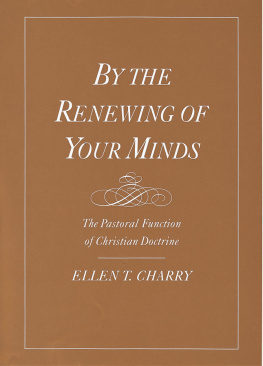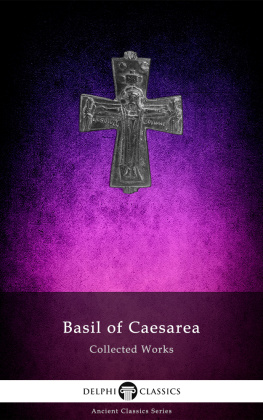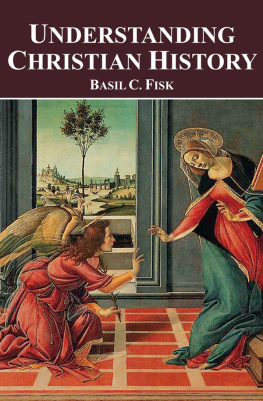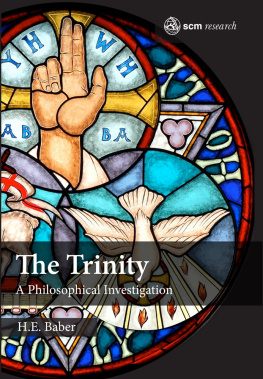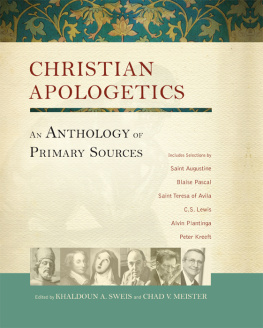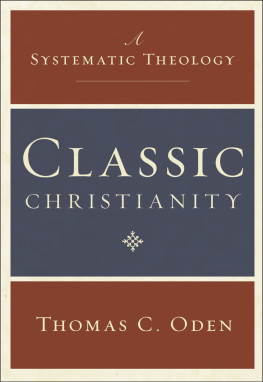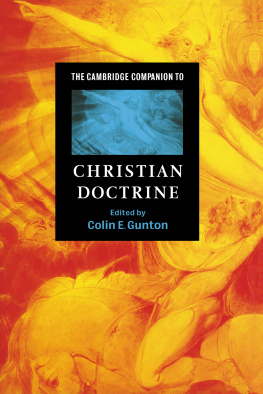The first Christian theologian prepared Christians for the worlds inability to comprehend their vision of human dignity and happiness. First Cor. 1.1831 begins, For the message of the cross is foolishness to those who are perishing, but to us who are being saved it is the power of God. The passage then points out that those who have come to understand Christ as the source and strength of their life will be undisturbed by the vicissitudes and temptations of life. Pauls message remains a stumbling block to Jews and foolishness to pagans. But those who know themselves bound up in the life of God are free from the power of the world, for they flourish by knowing and loving God.
Flourishing born of enjoying God also has consequences for our relationships with one another. For Christians have been taught by God to love each other (1 Thess. 4.9 NIV). Paul assumed that God not only made us his own, thereby freeing us from the worlds power, but went beyond this to teach noble conduct on the horizontal plane.
Unless we center in God, Christians claim, we are lost. We do not really know who we are, from whence our life takes its orientation, or where we ought to direct our energies. Without God we are liable to float aimlessly at the mercy of volatile emotions and hormones or be seduced by less worthy companions than the maker of heaven and earth. Or we may turn to ourselves in a misguided search for fame, wealth, or power. Paul put the issue rather starkly when, in admonishing the Christians at Rome to choose formation by God over formation by the world, he wrote, Do not conform any longer to the pattern of this world, but be transformed by the renewing of your mind. Then you will be able to test and approve what Gods will ishis good, pleasing and perfect will (Rom. 12.2 NIV).
For Paul, the mental transformation required for excellent living derives from the Greek observation that knowing goodness precedes being good. Plato taught that virtue requires insight, not simply rule-following. There is a standard of absolute goodness against which we distinguish what is good from what is not in conversation with other seekers. Aristotle realized that becoming good requires practice; the virtuous life is a skilled life. Christians valued both insight and practice by insisting both that moral transformation comes from knowing God and that virtue is acquired by practice. Augustine would nuance this insight, arguing that knowing God was necessary but not sufficient for conformation to God; loving God was also necessary. Augustine thus steered Western Christianity to the view that by knowing God we come to love him, and by loving him we come to know him. And seeing in himself that he could not muster the strength to love God sufficiently to be transformed by God, Augustine insisted on the necessity of prevenient grace. Thomas Aquinas subsequently brought Aristotles emphasis on practice into central focus to complement the Platonic thrust of the tradition.
This work assumes that thinking of insight-oriented and practice-oriented options regarding the formation of virtue as a forced choice is a false dichotomy. Human beings are too complex and malleable for us to think rigidly about character formation. Current schools of psychology focusing exclusively on insight-oriented versus behavior therapy perpetuate this perceived opposition. A self-examined life is certainly desirable. Yet unless honed by experience, knowledge lacks nuance, since decision-making requires constant shifts in judgment in assessing information and circumstances. Consequently, the approach taken here will highlight both knowing and doing.
The patristic age emphasized sapience as the foundation of human excellence. Sapience includes correct information about God but emphasizes attachment to that knowledge. Sapience is engaged knowledge that emotionally connects the knower to the known. In the West, knowledge of Gods grandeur and wrath inculcated a strong sense of sinfulness in the individual who contrasted him or herself with God. In this view, growth in the Christian life turned on the ability to trust God as a father rather than fear him as a master. In the East, the emphasis was on likeness to God, by means of which we turn to him from less worthy pursuits. Both traditions, however, insisted that God is the origin and destiny of human happiness, that knowing and loving God are the foundation of human self-knowledge and direction, and that lifes goal is conformation to God.
Beginning with Saint Benedict, in the sixth century, anxiety about ones ability to be sufficiently humble and obedient came to the fore. This eventually led Luther to reassert the mercy of God through the principle of justification by grace through faith, a principle that assured believers that Gods love was freely given and not dependent on their success or failure at pleasing him. Although knowing God dominates Calvins theology, he nevertheless turned Protestantism away from the vision of God as the goal of life and instead stressed the centrality of trust in Gods love, even while insisting that God indeed may not elect all to salvation. With the seventeenth century, abetted by the epistemology of John Locke, theology began to dismantle the notion of sapience altogether.
Sapiential theology waned with modernity. Theology came to be thought of as the intellectual justification of the faith, apart from the practice of the Christian life. The wisdom of God has ceased to function in the church as the foundation of the good life. Theology is no longer expected to be a practical discipline, burdened as it is in the modern period with the awkwardness of speaking of God at all. Theology became preoccupied with considerations of the conditions of knowledge. And even this enterprise is now questioned by postmodern descendants of Nietzsche, who dispute the notion of knowledge altogether, asserting that knowledge is simply a front for power. In order to reclaim the sapiential function of theology it will first be necessary to suggest how theological claims may be understood to refer to God. Once it is clear that we may speak about knowing God, it will be necessary to ask how we come to love God.
This study examines primary Christian doctrines and teachings from the Apostolic era through the Reformation in order to argue that a central theological task is to assist people to come to God. This itself is a contested idea for modern theology, which has moved away from primary Christian beliefs and focused on theological method instead (). These include rules and principles that distinguish what is authentic to a community from what is not, how to maintain consistency among its teachings, how to relate its authentic self-understanding to competing or alien claims (thereby ascertaining the scope of comprehensiveness of its authority), and how to organize rules for deriving and arguing for its teachings.
Second-order thought is helpful in maintaining community identity and coherence, but Christian is clear that issues of method do not exhaust the theological task. Religious communities also have primary doctrines that teach members to form a coherent pattern of life by modeling themselves on exemplary individuals through practices that shape their lives, and by habits of thought and behavior (5). Christian designates primary doctrines as first-order assertions that identify the setting for a religious life and teach about God (in the Christian case) in relation to human life. They also propose right courses of action, virtues, and dispositions to be adopted by members (8). In short, primary doctrines are the practically oriented content of the faith. They enable a religious community to propose a pattern of life to its members and nurture them in it as best it can (44).
Second-order reflection should support the primary doctrines of a community and so is indirectly of practical import. For much of Christian history, theology focused on primary doctrines. Only when knowledge itself became problematic was special attention given to second-order thought. One example of a theologian who engaged in both is Thomas Aquinas. He set forth the bulk of his great compendium of Christian theology with a second-order discussion of the conditions of knowledge under which he was operating prior to explaining the faith for believers.

